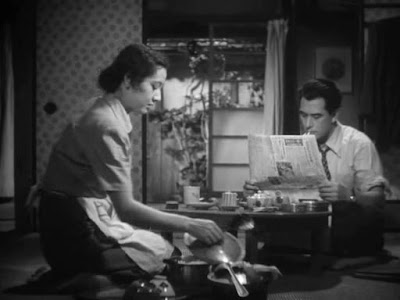Tuesday, March 12, 2013
Repast (1951)
You think you know Setsuko Hara.
I discovered the Japanese actress the same way, I bet, that a lot of you did: through the works of her friend, and favourite director, Yasujiro Ozu. Ozu’s ‘Noriko Trilogy’—so-called because all three films starred Hara as a woman named Noriko—are considered among his best work. Given Ozu’s stature, that makes them three of the best films ever made.
Hara worked for other directors, of course, but I’d never seen an example. And until I did, I didn’t realize how wholly the actress and the Noriko character were merged in my mind. It wasn’t simply Noriko who possessed that infinite patience, that commitment to self-sacrifice, that smile of steel—those were, for me, Hara’s traits too. And that made Repast, a major work by director Mikio Naruse, starring Hara, revelatory for me in a way that it might not be for everybody. Here, for the first time, I saw Hara look… grumpy. That was big.
She has her reasons. Hara plays Michiyo Okamoto, the wife of Hatsunosuke (Ken Uehara), a salary man in a rut. Hatsunosuke seems restless, but that restlessness hasn’t manifested itself in ambition. Michiyo is just bored. She’s tired of the drudgery of her life—that of a poor housewife, going through the motions. She wonders if this is all there is. The couple, it is strongly implied, hardly ever have sex. Money is tight too.
Repast’s dramatic punch rests on two potentialities: that Michiyo will walk out on Hatsunosuke, and that one or both of them will cheat. It could all happen, we tell ourselves. They’re both good-looking people; both frustrated and unfulfilled; both young enough to start again. And they have their chances.
Events are set in motion by the sudden arrival of Hatsunosuke’s niece, Satoko. Satoko (Yukiko Shimazaki) is a 20-year-old, free-thinking flirt who shows up at the couples’ Osaka home after fleeing an engagement in Tokyo—a wise move, since she’s clearly not ready for marriage. Satoko immediately makes herself comfortable; indifferent to the personal and financial strain her presence causes her uncle and aunt.
In some films, this girl would be an enlightening figure—a carefree spirit who reminds the older pair of the vitality they’ve lost, and shows them how to regain it. But Satoko is really a selfish dimwit, and it’s only by pursuing her own aims that she impacts anyone else for the better. Michiyo dislikes her, probably because Satoko is about the age Michiyo was when she got married, and Satoko’s not getting married.
There’s one more thing: among the several men Satoko flirts with is Hatsunosuke himself. And her uncle does return the affection, though not overtly. Naturally, Michiyo is threatened by this; and we, the viewers, are a little weirded out by it, given the blood relationship. But it does give the film an edge, and it makes Michiyo’s own, possible infidelity seem more likely. Someone as level-headed as Michiyo seems like a longshot to cheat; at least, if the only motivating factor is her feelings of futility. Rage, though? That might get her into someone else’s bed.
Under Naruse’s direction we move swiftly from moment to moment, from one emotionally triggering event to the next. The sadness and desire these people feel is real. Scenes are occasionally lurid—the actors bathed in thick shadow as they ponder the places they might go. But I found it hard to believe they’d go anywhere, at least for long. Repast is a very good film, but not a great one, because the mechanisms aren’t in place to make the couple’s dissolution permanent, and we know it.
This is partly due to the nature of the couple themselves. I didn’t believe, for example, that Hatsunosuke’s wandering eye would lead to anything more, even though Satoko herself seems at ease with betrayal. And while Michiyo chafes in her role as housewife, we never learn what she would have rather been--so how serious could her commitment to change be? What is her dream? Perhaps she doesn’t know either.
The conclusion of the film bothered me. I don’t think events are resolved to Michiyo’s satisfaction, which would be fine, except she appears satisfied. And while it’s fair to say that her closing remarks about the purpose of womanhood are a product of the time, given the insight into Michiyo’s feeling that we’ve enjoyed up to that point, they seem remarkably obtuse.
I wanted more. More pain and suffering I suppose, but hey: that’s often the stuff of great drama. Here was a vulnerable marriage. Here was a Hara character more volatile, less steady, less sure of the world than any Noriko—someone who could drift far afield, and perhaps, needed to. What if she had? What would we have had, then?
Where to see Repast:
Repast (Meshi) will screen at Toronto’s TIFF Bell Lightbox on Saturday, March 23, 2013; part of the retrospective Japanese Divas: The Great Actresses of Japanese Cinema’s Golden Age.
Subscribe to:
Post Comments (Atom)





No comments:
Post a Comment